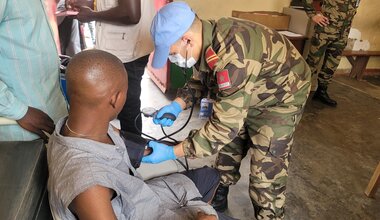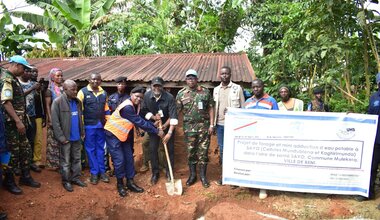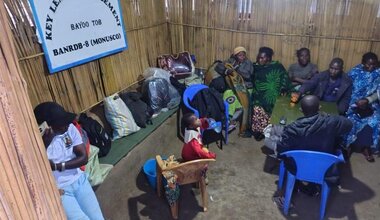In eastern DRC, Roger Meece attends a destruction of weapons and ammunitions
Goma, 10 November 2012 - On 26 October 2012, Mr. Roger Meece, Special Representative of the Secretary-General in the Democratic Republic of the Congo and Mr. Alexandre Luba Ntambo, Vice-Prime Minister and Defense Minister, attended a ceremony for the destruction of 242 small arms and 15,000 ammunitions in Goma, Nord-Kivu province.
Three hundred and five (305) other weapons still operational were handed over to the authorities. This is the result of sensitization activities provided to armed groups by the Section of the United Nations Organization Stabilization Mission in the Democratic Republic of the Congo (MONUSCO) in charge of Disarmament, Demobilization, Repatriation, Reinsertion and Resettlement (DDRRR). The ceremony was also attended by national and provincial authorities, both civilian and military.
Elements from the various armed groups in the east are from different ethnic backgrounds and nationalities. In his speech, Mr. Meece, Head of MONUSCO, noted that the combatants who were sensitized voluntarily disarm and are then returned to the authorities of their home country. For the Congolese Minister of Defense, the weapons thus far collected are evidence of the presence of "negative" forces. "They are disturbing peace and deteriorating the good-neighborly relations between the countries of the sub-region," said Mr. Ntambo.
To this day, the figures presented by MONUSCO speak for themselves: from 2002 to 2012, MONUSCO DDRRR Section demobilized a little more than 15,957 foreign ex-combatants, including combatants from Rwanda, Uganda and Burundi, as well as 12,282 dependants. All of them returned to their home country. But MONUSCO efforts go further still; with military and civilian staff being deployed throughout the province in order to welcome ex-combatants who have decided to surrender, and where appropriate, combating the active armed groups in order to reduce their capacity to cause harm.
Sylvestre Kilolo/ MONUSCO
 ONU
ONU Nations Unies Maintien de la paix
Nations Unies Maintien de la paix





